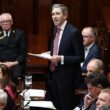Deputy Leo Varadkar’s speech to the Dublin Economic Workshop in Kenmere last weekend should send a chill down the spines of working people, the unemployed and those in general who depend on public services, all of whom have already been made pay a heavy price for this economic crisis.
Advocating cuts in this December’s budget in the order of €5 billion to €6 billion, Deputy Varadkar does not for one moment acknowledge the real life consequences for schools, hospitals and local authority services, all of which would face even greater devastation under his proposals.
Nor does he dwell for a single moment on the possibility that Fine Gael’s failure to fully capitalise on the disastrous policies of this government are due in large measure not to the shortcomings he and most of his fellow Fine Gael Dáil deputies see in his leader Deputy Kenny but rather a widespread awareness among working class and even middle class people that his so called alternative represents even more of the same in greater measures with worse consequences.
Nowhere in his reported comments is there any consideration of a wealth tax or increasing corporation tax or seriously reducing the tax breaks which overwhelmingly benefit the rich in order that schools, hospitals, social welfare, state pensions and other essential services and payments be preserved or improved.
His claim that Fine Gael would go further than Margaret Thatcher’s infamous cuts which devastated communities across Britain in the 1980s and that he favours the introduction of water charges, a property tax and privatising state assets like Bord Gais and ESB greatly impressed his predominantly right wing economist audience who see in him Fine Gael leadership material.
But his speech should serve as a warning to rank and file trade unionists, community groups and hospital campaigns of what a government in which Fine Gael plays a prominent role means. Unlike Deputy Varadkar who holds a positive regard for the Thatcher years in Britain, we on the left look instead to the positive example of the mighty anti Poll Tax movement when ordinary people rose up against her ended her dreadful reign. Similar movements of people power will be required up to and beyond the next general election. Also urgently required is the building of a real left alternative to the establishment club of Fianna Fáil, Fine Gael and Labour who are all fully signed up to the cuts agenda.











